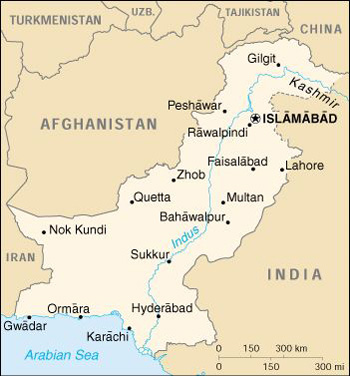PAKISTAN CARPET INDUSTRY STILL
SHIPPING CARPET OUT, BUT BUYERS
NOT TRAVELING INTO COUNTRY
By Lissa Wyman
Pakistan carpet production is experiencing some disruption since emergency rule was declared in Pakistan Nov. 3, but shipments are still leaving routinely by ship and air, according to importers and manufacturers.
The biggest concern is that the normal flow of buying and selling has been disrupted as the political situation becomes more critical.
"Shipments are still going out, but customers are certainly not coming in," commented Akhtar Nazir (Cooki) Khan, president of Miaco International, Lahore, Pakistan, and chairman of the World Handmade Carpet Organization. Khan spoke to Rugnews.com by telephone on Tuesday.
Khan said that Lahore is relatively peaceful, and for the most part citizens do not feel physically endangered. "Our concerns are currently centered on business. We hope for the best, but we can't predict how long the situation will be in effect," Khan said.
|

Rug making centers in Pakistan are near
Lahore, Peshawar, Islamabad and Karachi.
|
Emergency rule was imposed Saturday Nov. 3 by Pakistan president General Pervez Musharaf. The emergency order included suspension of the country's constitution, the dissolution of the Supreme Court and the four provincial High Courts and the silencing of privately owned television news channels. Since then, there have been outbreaks of resistance in Karachi, Islamabad and Lahore. Carpet production is also centered in those three cities, as well as in Peshawar, near the Afghan border.
"We have not had any disruptions with deliveries, but if the situation continues, it could very well impact business," said Ron Couri, chief executive officer of Couristan.
"Right now, I don't think Kelly Watson, our director of product development, is too keen to travel to Pakistan, so if long range, there could be delays in planning new products," he added.
Today's Internet technology helps to a certain extent. "We are doing as much as we can with Skype and e-mail, but there comes a point when you have to be there," said Couri.
"We are getting assurances from our agents in Pakistan that shipments are leaving the country as scheduled and that there is no interruption in production," said Arya Momeni, vice president of Momeni
"Of course, we are very concerned about issues of security for the people working in the industry, but we have no indication that business has been interrupted," he said. "However, I don't think I would have any trouble getting a seat on a flight to Pakistan."
Looking beyond the rug business, Momeni also expressed sympathy for the state of Pakistan's economy as a whole. "Moody's has downgraded the country's bonds, and there was a big drop in the Pakistan stock market," he pointed out.
Pakistani production is a small but growing portion of Momeni's business, Momeni noted. "Pakistan is very important in our hand-knotted rug programs," he said.
Arash Yaraghi, a principal of Safavieh, noted that unrest has been centered in the major cities of Pakistan. "The weaving centers are removed from the political chaos of the cities, so international trade has not really been affected," he said.
"As long as the shipping ports and airports remain open, we are okay," he added.
Yaraghi said that Pakistani rugs are growing in importance for Safavieh. "We are adding a new collection in January. Pakistani-knotted rugs have a certain look that can not be duplicated anywhere else in the world," he observed.
"If the current crisis continues, it will certainly affect production, but we have been in close contact our suppliers and shipments are still leaving Pakistan on a normal basis," said Lee Harounian, a principal of Harounian Rugs International. "As long as the airports and ports remain open, it is business as usual."
Harounian, like other importers, was most deeply concerned for the people of Pakistan. "We want to let the people of Pakistan know our thoughts are with them, We hope that the country's leadership will do what is best for the citizens," said Harounian.
Michael Massman, vice president of national sales for Due Process STable Trading, said that the state of emergency in Pakistan has slowed down production, "but we are still getting our merchandise in an orderly manner."
Pakistan hand knot production is an important part of the product mix for Due Process, which specializes in high end and luxury goods.
John Megerian, chief executive officer of Megerian Rugs, said Megerian owns its own carpet production facilities in Pakistan near Lahore and Peshawar. It's a specialized world of its own, he explained. "Our Pakistan production is unique in that we specialize in antique hadji-jalili tabriz reproductions. We train our weavers in our proprietary techniques," Megerian said.
"Our weaving plants are very secure, and all the weavers are employees of Megerian," said Megerian. "The current political situation has not had any adverse effect on production or shipment."
Megerian noted that Megerian employs both Afghani and Pakistani weavers. In the post-Taliban years, many Afghan weavers have begun to return to their homeland. "We have recently established a small production facility in Afghanistan to accommodate their needs," said Megerian.
According to import figures compiled by the US Department of Commerce, office of Textiles & Apparel, Pakistan ranks as the third largest exporter of wool hand made carpet to the US.
In 2006,US imports of Pakistani wool carpet amounted to $113 million, about 11% of the total $1.03 billion in worldwide wool carpet imports. (The figures include both rugs and broadloom carpeting).
To learn more about Department of Commerce import statistics, click here.
11.08.07